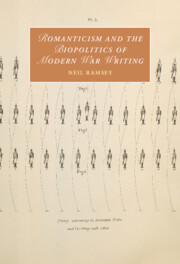Book contents
- Romanticism and the Biopolitics of Modern War Writing
- Cambridge Studies in Romanticism
- Romanticism and the Biopolitics of Modern War Writing
- Copyright page
- Contents
- Acknowledgements
- Introduction
- 1 Writing and the Disciplinarisation of Military Knowledge
- 2 Strategy in the Age of History
- 3 Robert Jackson’s Medicalisation of Military Discipline
- 4 More a Poet than a Statesman
- 5 Thomas Hamilton’s Wordsworthian Novel of War
- Afterword
- Bibliography
- Index
- Cambridge Studies in Romanticism
3 - Robert Jackson’s Medicalisation of Military Discipline
Published online by Cambridge University Press: 25 April 2023
- Romanticism and the Biopolitics of Modern War Writing
- Cambridge Studies in Romanticism
- Romanticism and the Biopolitics of Modern War Writing
- Copyright page
- Contents
- Acknowledgements
- Introduction
- 1 Writing and the Disciplinarisation of Military Knowledge
- 2 Strategy in the Age of History
- 3 Robert Jackson’s Medicalisation of Military Discipline
- 4 More a Poet than a Statesman
- 5 Thomas Hamilton’s Wordsworthian Novel of War
- Afterword
- Bibliography
- Index
- Cambridge Studies in Romanticism
Summary
Chapter 3 considers the evolution of military disciplinary practices as military thought became ever more akin to a human science. It focusses on a key work in the theorisation of military discipline, Robert Jackson’s A Systematic View of the Formation, Discipline, and Economy of Armies (1804). Drawing on his extensive experience as a surgeon in the British army, Jackson places the medicalised body at the heart of military discipline. He insists that the soldier must be viewed as a living organism, possessed of a complex and self-governing interiority that determines how tactics operate. In Jackson’s conception, the soldier appears as a self-governing figure who functions independently and at a distance from disciplinary sites, a figure who more closely resembles the modern subject than the mechanical automatons associated with Frederick the Great’s military drill practices. More than this, however, Jackson’s book reveals how Romantic aesthetics penetrated military thought. The military’s concern with the imagination of the soldier in the field was undoubtedly a ‘shock’ to poets, Clausewitz surmised, but was nonetheless central to emergent aesthetic concerns with perception and interiority that suggest an unexplored context of wartime media surrounding a Romantic poetics and its formation of subjectivity.
Keywords
- Type
- Chapter
- Information
- Romanticism and the Biopolitics of Modern War Writing , pp. 114 - 148Publisher: Cambridge University PressPrint publication year: 2023



